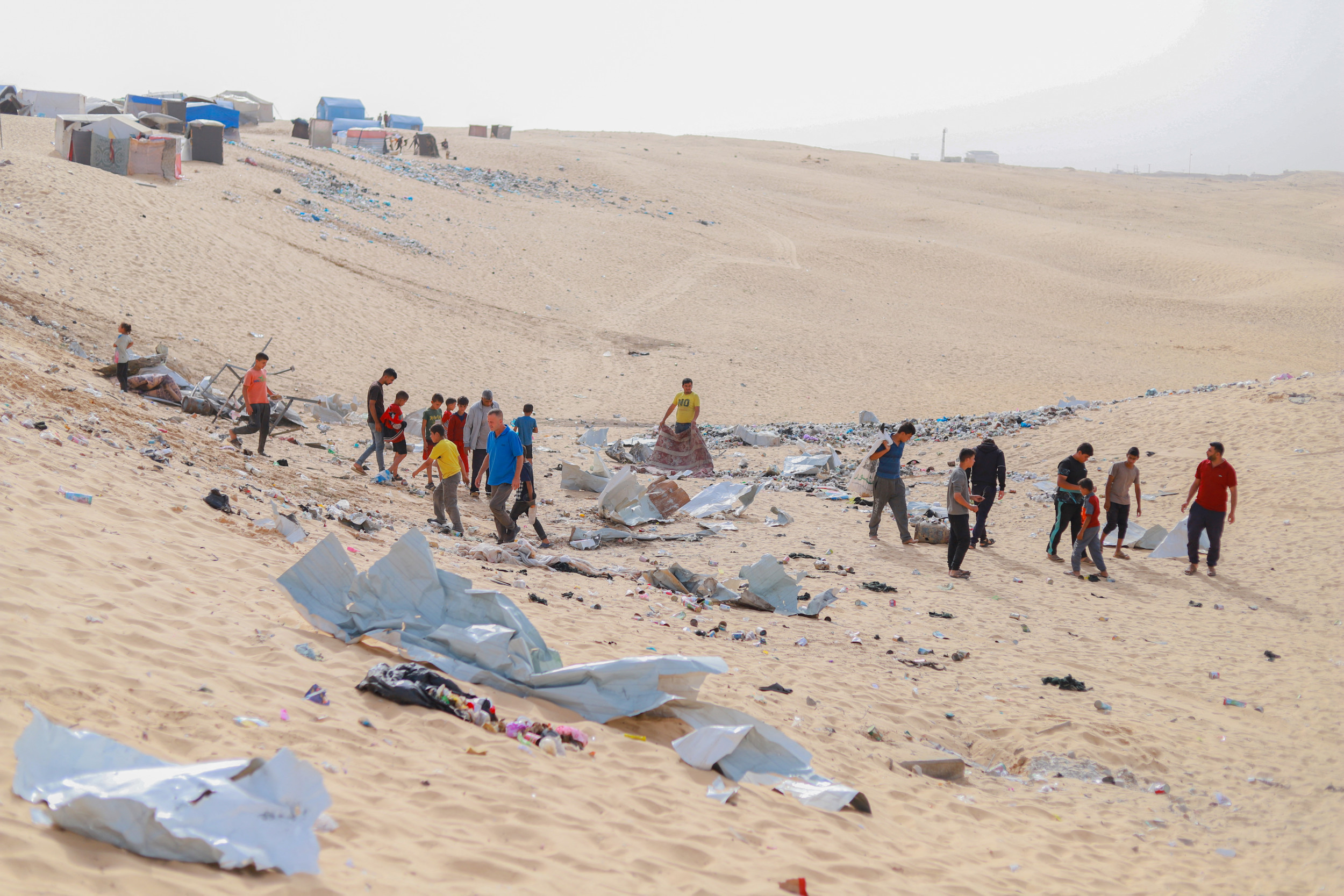A phrase calling for the world to pay attention to the plight of people in Gaza is gaining momentum on social media months after it was uttered.
The words “All Eyes on Rafah” depicted by the arrangement of tents in a desert backdrop form a striking tableau, which has gone viral following Israeli strikes on the southern Gaza city on Sunday that caused makeshift shelters to burst into flames with their occupants still inside, killing at least 45 people.
The attack prompted calls for the International Court of Justice (ICJ) to enforce its ruling demanding that Israel cease its attack on Rafah. Israel said the strikes targeted and killed two senior Hamas officials, and that the fire may have been caused by an explosion at a Hamas weapons store nearby.
As of Wednesday, the “All Eyes on Rafah” slogan had received tens of millions of views and among celebrities who shared it, mostly via Instagram stories, were Bella Hadid, Australian comedian Celeste Barber, actor Aaron Paul and Bridgerton star Nicola Coughlan.

Khames Alrefi/Middle East Images via AFP
Marc Owen Jones, an associate professor of Middle East studies at Hamad Bin Khalifa University in Qatar who studies misinformation, told NBC the image, in which the tent camp is unusually symmetrical, looked AI-generated.
The Palestinian, an X account of a Gaza resident, posted the image on the social platform, which had by Wednesday afternoon had got 7.1 million views. When contacted by Newsweek, the X user described the image and the message it conveyed as “so effective.
“I saw many celebrities from different fields sharing it especially football players and actors and actresses. We all need this support and it will help so much in the future to gain our rights.”
The catch cry appears to refer to comments made on February 14 by Rik Peeperkorn, director of the World Health Organization’s Office of the Occupied Palestinian Territories (OPT), after the Israeli prime minister, Benjamin Netanyahu, ordered an evacuation plan be drawn up for the city.
Peeperkorn told a WHO press briefing from Rafah that full-blown Israeli entry into the area, where 1.5 million displaced Palestinians were gathered, would be an “unfathomable catastrophe, further expanding the humanitarian disaster beyond all imagination.”
“All eyes are on Rafah,” Peeperkorn said, at a time when Egyptian, U.S. and Qatari-mediated negotiations over a possible ceasefire deal were ongoing.
The phrase has since been repeated by groups keen to keep the world’s attention on the area, including Save the Children, Oxfam, the Jewish Voice for Peace, and the Palestine Solidarity Campaign. It has also been used as a rallying cry at protests in cities such as Paris, London, the Netherlands, New York City and Los Angeles.
Newsweek has contacted the WHO OPT and the Palestine Solidarity Campaign for comment.
Following the Hamas attacks on Israel on October 7, in which 1,200 people were killed and 250 taken hostage, Netanyahu has said victory against the militants can’t be achieved without taking Rafah.
Catastrophic Humanitarian Consequences
Israel has rejected warnings of catastrophic humanitarian consequences from the ground operations that started in the east of the city on May 6. As of Wednesday, at least 35,000 people in Gaza had died in the seven-month war, according to health officials in the territory, cited by the Associated Press.
Meanwhile, Mercy Corps vice president of global policy and advocacy Kate Phillips-Barrasso said that 95 percent of people in the Al-Mawasi region north of Rafah, which is considered a humanitarian zone, face “harrowing” conditions.
“They have no electricity, no water, and no sanitation facilities, all while exposed to extreme heat, insects and the elements,” Phillips-Barrasso told Newsweek in an emailed statement on May 24.
“The overcrowding is so severe that the worn-out nylon tents lining the roads reach the beach, where the waves flood them at night with the tides,” she said, “the Rafah incursion has brought the devastating humanitarian fallout we predicted and feared.”
Update 05/29/24, 8:21 a.m. ET: This article was updated with comment from X account The Palestinian.
Uncommon Knowledge
Newsweek is committed to challenging conventional wisdom and finding connections in the search for common ground.
Newsweek is committed to challenging conventional wisdom and finding connections in the search for common ground.

Gregory Daniels is your guide to the latest trends, viral sensations, and internet phenomena. With a finger on the pulse of digital culture, he explores what’s trending across social media and pop culture. Gregory enjoys staying ahead of the curve and sharing emerging trends with his readers.








